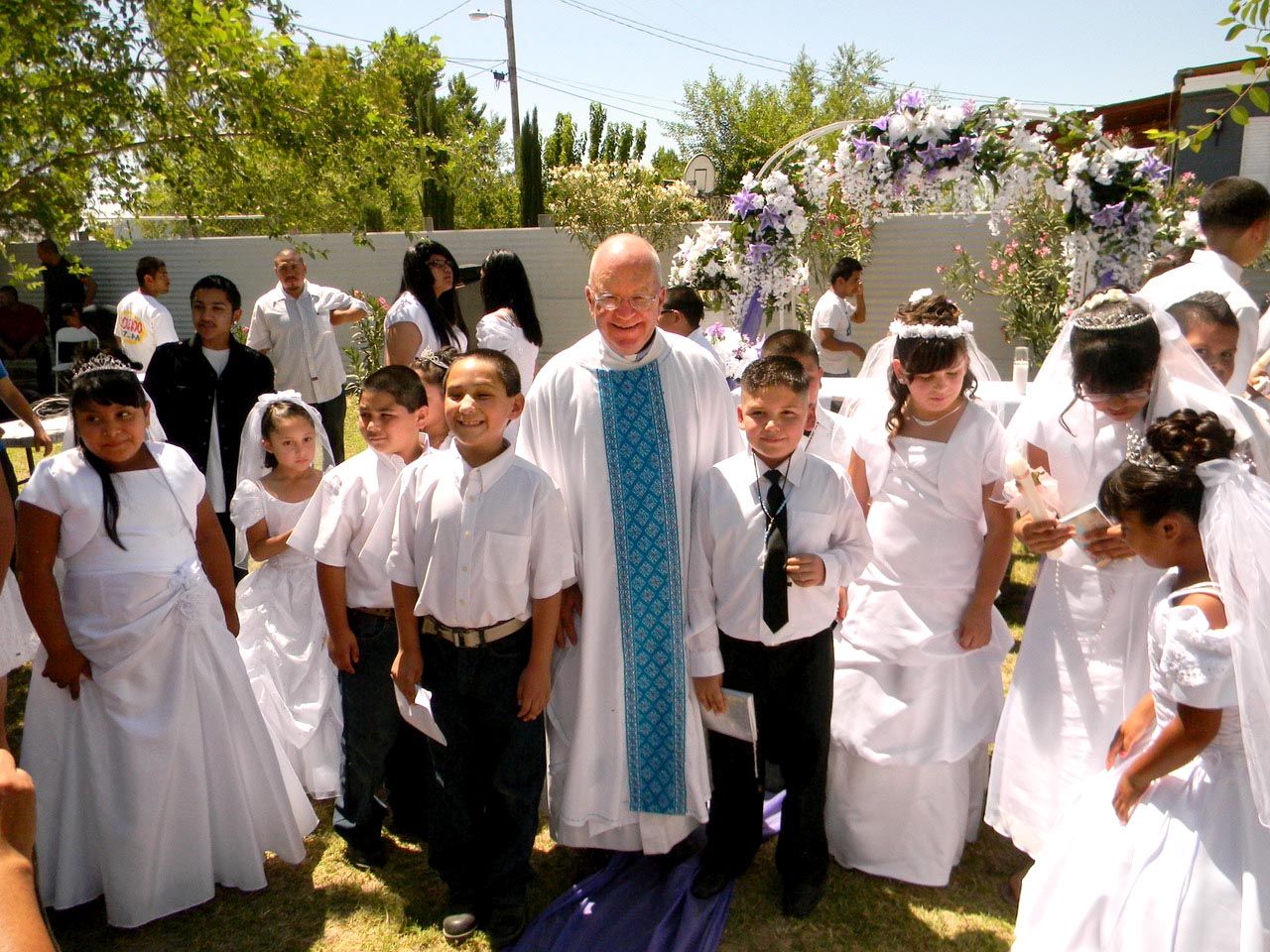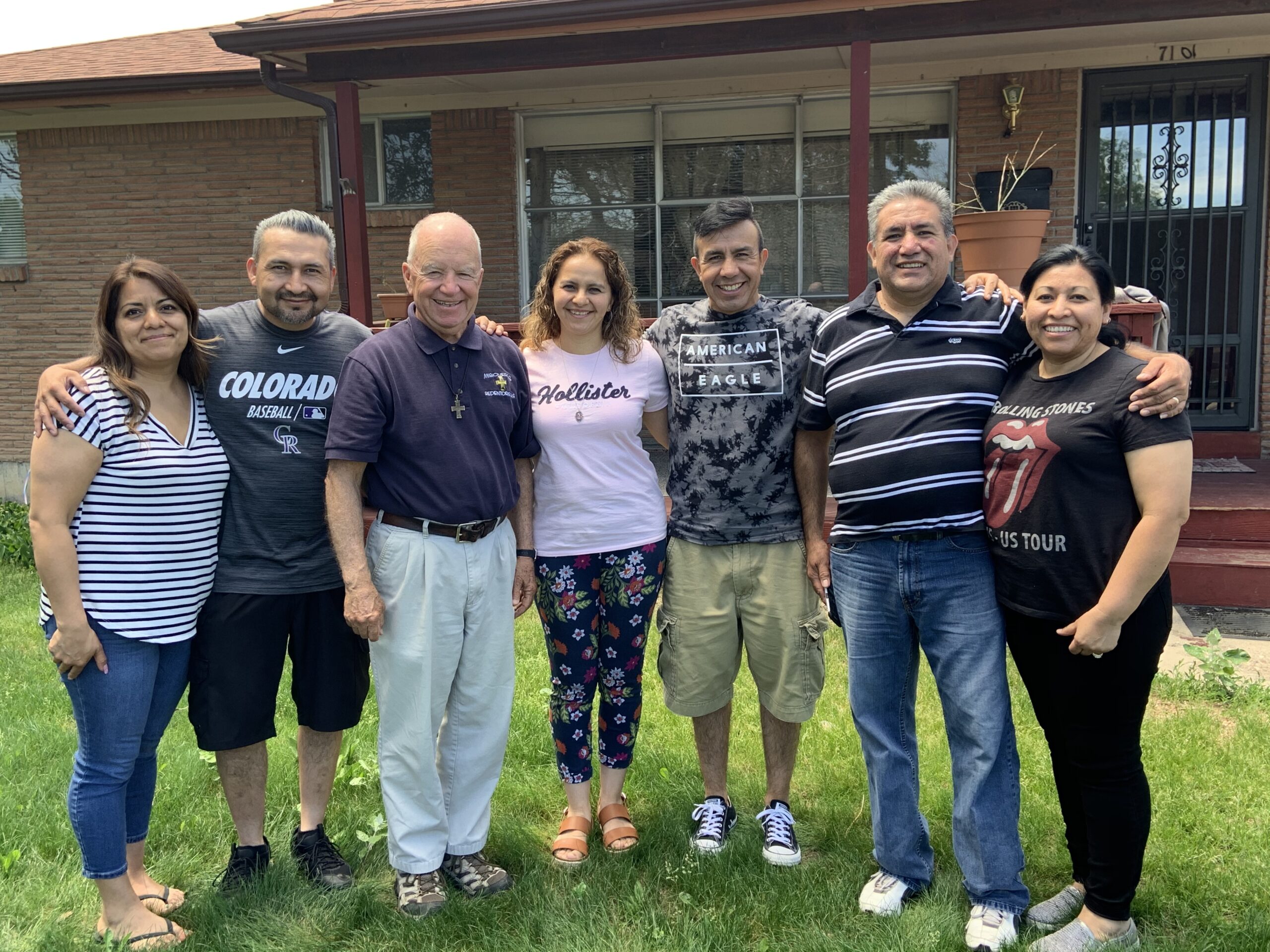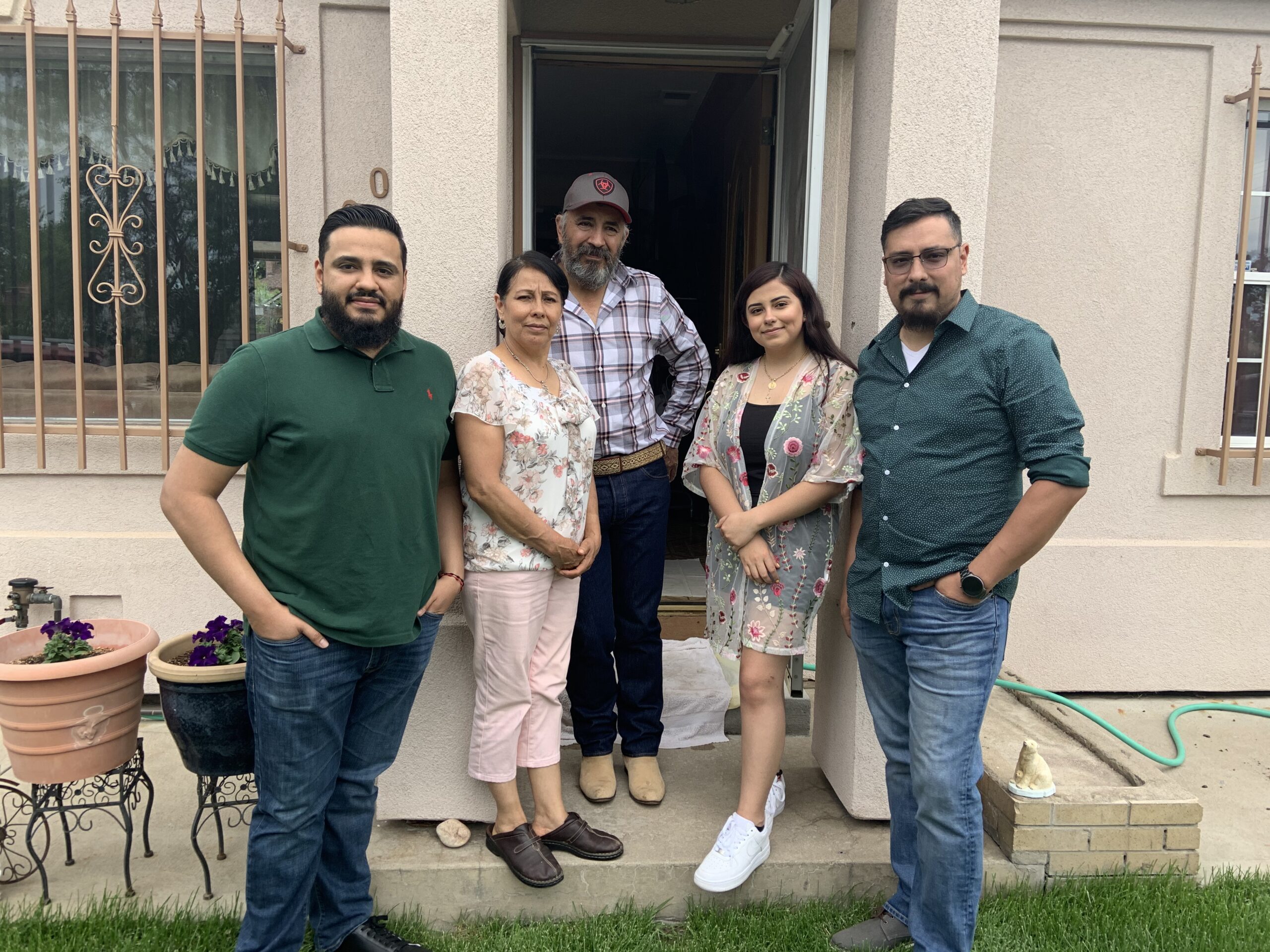Eucharist today: Sacramental responsibility of the priest / Responsibilidad sacramental del sacerdote
(This blog is taken from the book Migrant Faith, chapter eight. Migrant Faith is available on the Resource page of this website. It is also in Spanish, La Fe del Migrante.)
The sacramental responsibility of priests
Canon 843 addresses the responsibility of pastors: “The sacred ministers cannot refuse the sacraments to those who ask for them at appropriate times.”
A pastor has the duty to see that the person is properly prepared to receive the sacrament. Also, the canon calls on the pastor to make the grace of sacrament available. Responsibility in this canon refers to the activity of the pastor, not the petitioner. To fulfill this requirement, pastors oversee programs of formation in their parishes.
Administrative and pastoral guidelines for reception of the sacraments can be found in Canon Law, diocesan practices, and common-sense rules developed at the local community. On all levels, it is important to remember that the sacraments are the sign of Christ’s love for his people. For this reason, Canon Law covers many situations that demand discretion. When a person with special needs asks for the grace of sacrament, if there is any doubt that the person is able to understand the sacrament, the Church opts in favor of the person. See Canon 913. We need to develop practices around the sacraments that correspond to the realities in the lives of the people whom we serve. Rules are important, but the example of Jesus’ compassion for the sick, the blind, the lame and the outcast reminds us that ministry witnesses the love of God for the poor and most abandoned.
Canon 213 says, “The Christian faithful have the right to receive assistance from the sacred pastors out of the spiritual goods of the Church, especially the word of God and the sacraments.”
It is a “right”, not a privilege to receive the sacraments. This is a right rooted in Baptism. It is not a privilege granted by Church authorities, but a claim rooted in the action of Christ. In the former code of Canon law, this was presented as the only “right” directly stated for laypersons. The Second Vatican Council called for these goods (word and sacrament) to be made available in abundance.
No program serves the needs of all
Every parish needs alternatives for those unable to take part in the ordinary parish programs. No program serves the needs of all Catholics within a given parish. Even the most wonderful of programs are unable to be attended by significant numbers of people in any given community.
As pastor in rural Kansas, I insisted that we have a summer school program for First Communion for children unable to attend during the school year. Although some felt that the yearlong program was available to all and such a summer school was unnecessary, thirty-nine children from third to seventh grade entered the program. Over half of them came from farms and dairies outside of the town. Parents expressed gratitude that their children had the opportunity to receive their First Eucharist. It was difficult for them to bring their children into town during planting and harvesting. Also, in the winter there would always be a couple of snow days. We had an unusual experience in the attendance of the young people at the classes. The two-week program was for three hours each day, five days each week. All the students in the program had perfect attendance. Thirty-nine children having perfect attendance in a religious education program shows the gratitude of those families for this opportunity.
Rules, not barriers
From the earliest days of the Church there was a need for the initiation of new people into the faith. Hearing only the Sermon of Peter, 3,000 were received into the community on Pentecost. They were baptized and welcomed for the breaking of the bread.
St. Paul asked several men if they had received the Holy Spirit. When they said they had been baptized but did not even know of the Holy Spirit, St. Paul laid hands on them and they received the Spirit.
In the early Church, the Council of Jerusalem addressed the problem of bringing Gentiles into the Church. There was the question of whether Gentiles needed to be circumcised as Jews in order to be baptized into Christ. At the end of the discussion, Paul and Barnabas were sent to preach to the Gentiles. The Apostles sent along a letter that said, “It is the decision of the Holy Spirit, and ours too, not to lay on you any burden beyond that which is strictly necessary” (Acts 15:28).
In the early Church, the catechumenate developed as more people entered the Church. Rites of initiation developed as ways of welcoming people into the life of the community. There have been developments in religious education and formation from the beginning of the Church.
In the development of programs of formation, rules are established for the good order of a community. The methods of the programs form an orderly entrance into the life of the community for new members. Well-administered programs of Rite of Christian Initiation create wonderful experiences of welcome into the community for those able to participate in the experience. Yet life is filled with unexpected dilemmas in the lives of ordinary people. Programs that require attendance at certain numbers of classes or an extended period of time of preparation must address special circumstances.
Illness, the death of a loved one, the loss of a job, family crises, and other events enter the lives of ordinary people. No matter when a parish sets a schedule for classes, some people will not be able to attend the “ordinary” program. The poor, the migrant and young workers have very little control of their hours of work or the stability of their lives. Flexibility is necessary to respond to all of the instability in the lives of the People of God.
(Tomorrow:Reflection on the readings for Sunday))
(Este tema está en el libro, La Fe del Migrante, capítulo ocho. El libro está en la página de “Resources” en este sitio de web. Está en inglés también.)
Responsabilidad sacramental del sacerdote
El Derecho Canónico 843 se refiere a la responsabilidad de los sacerdotes: “Los ministros sagrados no pueden negar los sacramentos a quienes los pidan de modo oportuno, estén bien dispuestos y no les sea prohibido por el derecho recibirlos”.
El sacerdote tiene la responsabilidad de ver que la persona esté debidamente preparada para recibir los sacramentos. Además, el Derecho Canónico pide que el sacerdote de la gracia de los sacramentos. El Derecho Canónico se refiere a la responsabilidad del sacerdote y no de quien pide los sacramentos. Para cumplir con este requisito, los sacerdotes supervisan programas de formación en sus parroquias.
Las normas administrativas y pastorales para recibir los sacramentos se pueden encontrar en el Derecho Canónico, las prácticas diocesanas, y las reglas de sentido común desarrolladas en la comunidad local. En todos los niveles, es importante recordar que los sacramentos son una señal del amor de Cristo por su pueblo. Por esta razón, el Derecho Canónico cubre muchas situaciones que requieren discreción. Cuando una persona con necesidades especiales pide la gracia del sacramento, si hay alguna duda que la persona no puede entender el sacramento, la iglesia opta en favor de la persona (Derecho Canónico 913). Debemos desarrollar prácticas en relación a los sacramentos que correspondan a la realidad en las vidas de la gente que servimos. Las reglas son importantes, pero el ejemplo de la compasión de Jesús por el enfermo, el ciego, el lisiado y el marginado nos recuerda que el ministerio da testimonio del amor de Dios por el pobre y el más abandonado.
El Derecho Canónico 213 dice: “Los fieles tienen derecho a recibir de los Pastores sagrados la ayuda de los bienes espirituales de la Iglesia principalmente la palabra de Dios y los sacramentos”.
Es un “derecho”, no un privilegio recibir los sacramentos. Éste es un derecho enraizado en el Bautismo. No es un privilegio que otorgan las autoridades de la Iglesia, sino un derecho enraizado en la acción de Cristo. En el código antiguo del Derecho Canónico, esto se presentaba como el único “derecho” directamente establecido para los laicos. El Concilio Vaticano II pidió que estos bienes (palabra y sacramento) se otorgaran en abundancia.
Ningún Programa Atiende las Necesidades de Todos
Cada parroquia necesita alternativas para aquellos que no pueden tomar parte en los programas ordinarios de la parroquia. Ningún programa atiende las necesidades de todos los católicos en una parroquia determinada. Aún los programas más maravillosos no son capaces de atender las necesidades de un número significante de personas en una comunidad.
Como pastor en la zona rural de Kansas, yo insistí en que tuviéramos un programa de escuela de verano de Primera Comunión para los niños que no podían asistir durante el año escolar. Aunque algunos opinaban que el programa que duraba un año era adecuado para todos y que un programa de verano no era necesario, treinta y nueve niños del tercer al séptimo grado asistieron al programa. Más de la mitad de ellos venían de granjas y lecherías de las afueras del pueblo. Los padres expresaron gratitud porque sus hijos tuvieron la oportunidad de recibir su Primera Comunión. Era difícil para ellos traer a sus hijos al pueblo durante la siembra y la cosecha. Además, en el invierno siempre había unos días de nieve. Tuvimos una experiencia inusual en la asistencia de los jóvenes en las clases. El programa de dos semanas duraba tres horas al día, cinco días cada semana. Todos los alumnos en el programa tuvieron asistencia perfecta. Treinta y nueve niños con asistencia perfecta en un programa de educación religiosa muestran la gratitud de las familias por esta oportunidad.
Reglas, no barreras
Desde el principio de la Iglesia, había una necesidad de introducir a las nuevas personas a la fe. En Pentecostés, 3,000 personas escucharon el sermón de Pedro y la comunidad los acogió. Los bautizaron y los invitaron para la fracción del pan. San Pablo les preguntó a varios hombres si habían recibido al Espíritu Santo. Cuando le dijeron que habían sido bautizados pero que no sabían del Espíritu Santo, San Pablo les impuso las manos y ellos recibieron al Espíritu Santo.
En la Iglesia primitiva, el Concilio de Jerusalén habló del problema de admitir a los no judíos a la Iglesia. Se cuestionaba si los no judíos necesitaban ser circuncidados como Judíos para poder bautizarse en Cristo. Al final de la discusión, Pablo y Bernabé fueron enviados a predicarles a los no judíos. Los Apóstoles enviaron una carta que decía: “Fue el parecer del Espíritu Santo y el nuestro no imponerles ninguna otra carga fuera de las indispensables” (Hechos 15,28 ).
En la Iglesia primitiva, el catecumenado se desarrolló al llegar más gente a la Iglesia. Los ritos de iniciación se desarrollaron como medios para acoger a la gente en la vida de la comunidad. Desde el principio de la Iglesia, ha habido desarrollo en la educación y formación religiosa.
En el desarrollo de programas de formación, se establecen reglas para el buen orden de la comunidad. Los métodos de los programas introducen ordenadamente a los nuevos miembros a la comunidad. Los programas bien administrados del Rito de la Iniciación Cristiana crean experiencias maravillosas de bienvenida a la comunidad para aquellos que pueden participar en la experiencia. Sin embargo, la vida de la gente ordinaria está llena de dilemas inesperados. Los programas que requieren asistencia a cierto número de clases o un periodo extendido de tiempo de preparación deben tomar en cuenta las circunstancias especiales.
La enfermedad, la muerte de un ser querido, la pérdida de trabajo, una crisis familiar y otros acontecimientos ocurren en las vidas de la gente ordinaria. Para cualquier horario de clases que una parroquia establezca, siempre habrá personas que no podrán asistir a un programa “ordinario”. Los pobres, los migrantes y los trabajadores jóvenes tienen poco control de sus horas de trabajo y de la estabilidad en sus vidas. La flexibilidad es necesaria para responder a toda la inestabilidad en la vida del Pueblo de Dios.
(Mañana: Reflexión por las lecturas del Domingo)
Here are ten themes to be covered considering participation in the Eucharist today:
- Role of the Eucharist in my own personal vocation story
- Benefits of celebration of Eucharist where migrants gather
- Exposure of obstacles to reception of First Eucharis that migrants experience
- Bishop John Steinbock’s reflection at Fresno Convocation of Clergy, 2010
- “You only have the time that God gives you”
- Responsibility of the priest to make the word and the sacramental presence of Christ present for the People of God
- Remember that the sacraments of Baptism, Confirmation and Eucharist are sacraments of initiation
- Involve the parents in the sacramental preparation of children
- The place of Mystagogia, continuing education and spiritual development
- Quality migrant ministry can inspire the ordinary ministry of our communities
Aquí hay diez temas considerando participación en la eucaristía hoy:
- Papel de la Eucaristía en mi propia historia vocacional personal
- Beneficios de la celebración de la Eucaristía donde se reúnen los migrantes
- Exposición de obstáculos a la recepción de la Primera Comunión que experimentan los migrantes
- Reflexión del obispo John Steinbock en Fresno Convocación de los Cleros, 2010
- “Solo tienes el tiempo que Dios te da”
- Responsabilidad del sacerdote de hacer presente la palabra y la presencia sacramental de Cristo para el Pueblo de Dios
- Recuerde que los sacramentos del Bautismo, la Confirmación y la Eucaristía son sacramentos de iniciación.
- Involucrar a los padres en la preparación sacramental de los niños.
- El lugar de mystagogia, educación continua y desarrollo espiritual
- Un ministerio migrante de calidad puede inspirar el ministerio ordinario de nuestras comunidades.





